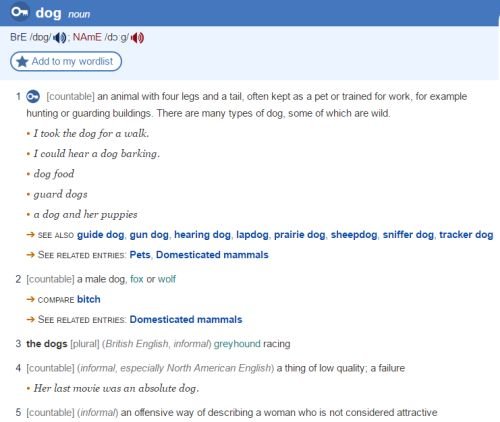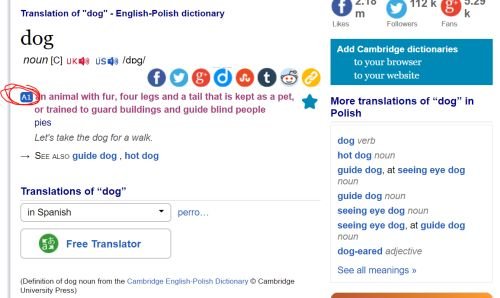Why shouldn't you use Google Translate for learning English and which dictionaries are faaaar better
Hi guys! This is my first post on this site. It is actually a repost from my original blog with minor changes, so, YES, you will find something very similar on the web and NO, it will not be plagiarism as I am the author of the original post :) If you like the post below please subscribe @cwbrooch :)
I am an English teacher (EFL - English as a foreign language, ESL - English as a second language), and have been one for more than seven years. I taught English to adults in Russia, the UK and of course my homeland Poland. No matter the country, I get a lot of questions about dictionaries and which I would recommend to students.
A Big No-No to Google Translate (Sorry Google...)
Google translate is not the key to everything! Once in a while, sure, especially if, like me, you know the English phrase but for some crazy reason you cannot remember its (insert your native language here) equivalent and looking up the word is simply a matter of reminding yourself of the word.
Google translate (GT) is a quick fix if you need something ASAP but not if you want to learn something (hopefully) permanently.
The magic of the dictionaries I want to show you is that they are all recognised and respected sites which definitely give you accurate information in various contexts and clear examples.
(Let it be known that I am not actively promoting any particular dictionary, no one is paying me for endorsing these sites and all I get is the satisfaction of letting you know that these websites exist :) )
Let's start...
Oxford Learner's Dictionary (O)
- an Advanced Learner's Dictionary but could also prove useful for less proficient learners.
Might be perfect for many native speakers, as very often they do not understand why there are using the language they're using :)

As you can see above, it is quite straightforward.
It gives you the part of speech, very often the most common synonyms. And what is most important for me: examples, examples, examples of various meanings.
A nice nice touch is also the British and American pronunciation.
Now, the million dollar question: what is this little key next to the word?
This is Oxford's way of indicating that the phrase/word is part of the group of 3000 most common words in English. Whether a word/phrase belongs to this group depends on its frequency, so how often it appears in written or spoken texts. All these texts are stored in the British National Corpus and the Oxford Corpus Collection.
Longman English Dictionary (L)
- A dictionary that prides itself on giving definitions of words that use only 2000 of the most common words. This means that you do not need to be a proficient English speaker to understand the definitions AND you can stop relying on bilingual dictionaries all the time!
The difference between (L) and (O) is that in the latter you can get lost in the list of all the phrases and meanings of one phrase/word. You need to scroll down to the bottom of the page if you are looking for idioms or something more complex than the simple "dog".
In (L) you type in the word in question, and the first thing you need to do is decide exactly what phrase you are looking for:

This is a great opportunity to actually learn new stuff, as even if you are looking for a simple definition of "dog" you see there are countless other options and start browsing. You don't get lost or discouraged by the vast amount of text like in (O).
Also,

what you don't get in (O) is a professional pronunciation of not only the phrase you want but also (many of) the examples! Because it is not read by a machine ( at least from what I've noticed) you can listen to the stress and connected speech which is a huge advantage if you don't have access to a teacher. :)
Longman's dictionary also shows you how often a word is used in English (according to the Corpus). It uses a different method, though.
You will not see this with every entry but it looks like this: Where W=used in writing, S= used in speech, 3= 3000 most common words, 2= 2000 most common words.
Cambridge Dictionaries Online (C)
The EXTREMELY useful thing about Cambridge is that it offers you a bilingual option for many popular languages!
This means you have a much more reliable source of information than Google (again, sorry Google...)

It is very similar in its layout to (O) with more phrases on the right in the corner; it gives you both British and American pronunciation. And also allows you to check the word/phrase in various languages. But, to me, it seems to be less detailed than (L) or (O).
It does, however, have a feature that I find very useful as a teacher:

It states what level (according to CEFR) a word/phrase belongs to.
I hope you found this post useful. Subscribe to me @cwbrooch for more awesome English and more :)
Thank you @noisy for introducing me to this site :)
Peace and love people. Happy studying!
CWBROOCH :)
CLICK HERE FOR ANOTHER LANGUAGE POST -> How to learn vocabulary effectively in any language!
Thank you. Very usefull.
Google translator is a good tool however is far away from perfection.
I did find this useful to certain extend, but nothing can be better than someone n the other side of the phone who can explain the context especially in English when one word can have few meanings.
few? more like a dozen :P
Thank you. It's really useful article. I use Translate for check my text only when i doubt to much. And i have noticed that it often shows me wrong constructions and verbs. It's makes me doubt even more than before Translate, and it has very bad influence, makes you to get used to the mistakes.
Im glad you liked it :) I think google cannot really see sentences that are in context... and idioms, are an absolute nightmare :P I would recommend using all three of the dictionaries above and see how they compare... but not many people have time for that kind of study :)
Yes, Google Translate sucks ass! I have Tried that crap tool translating my local language to English.
RECOMMENDED!